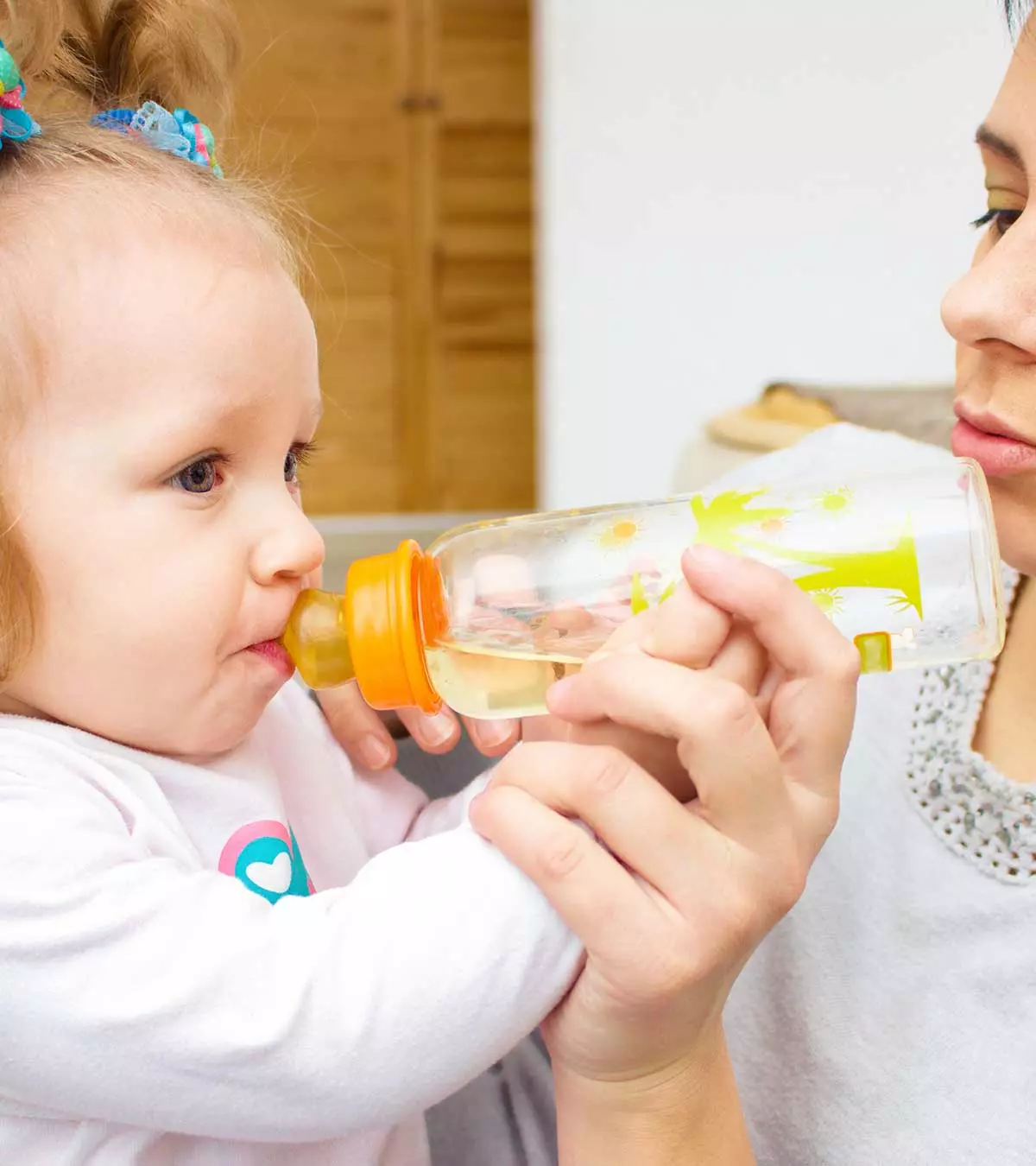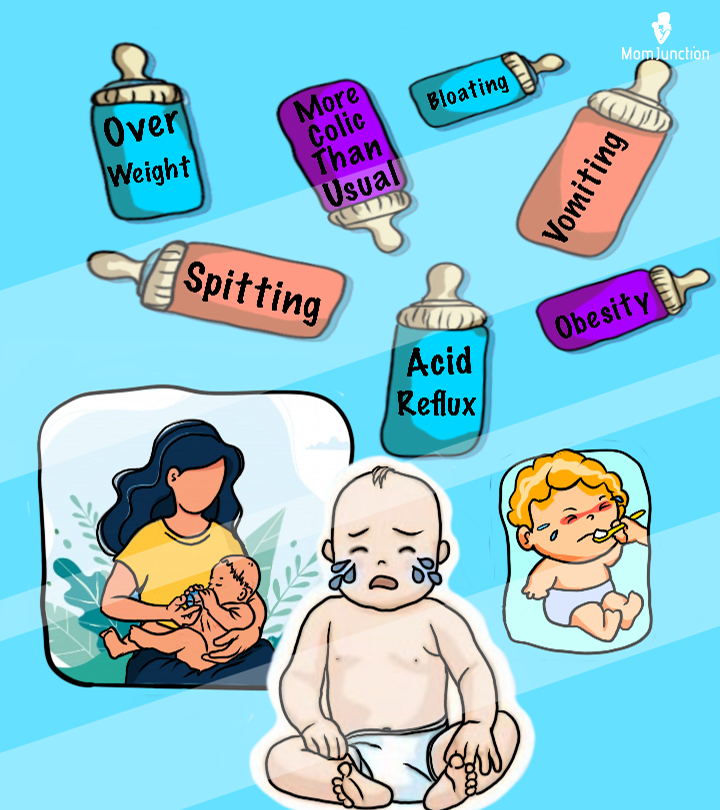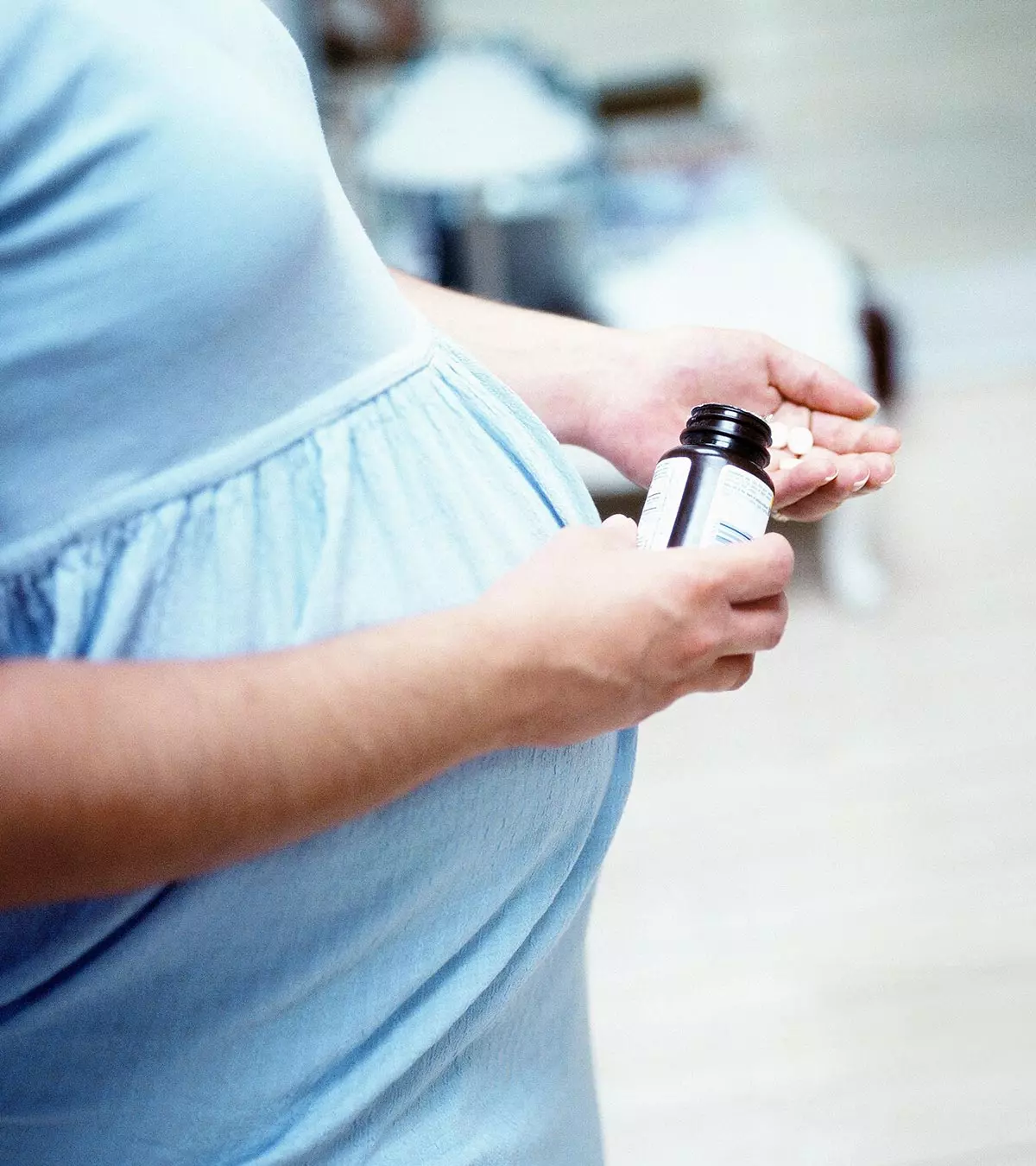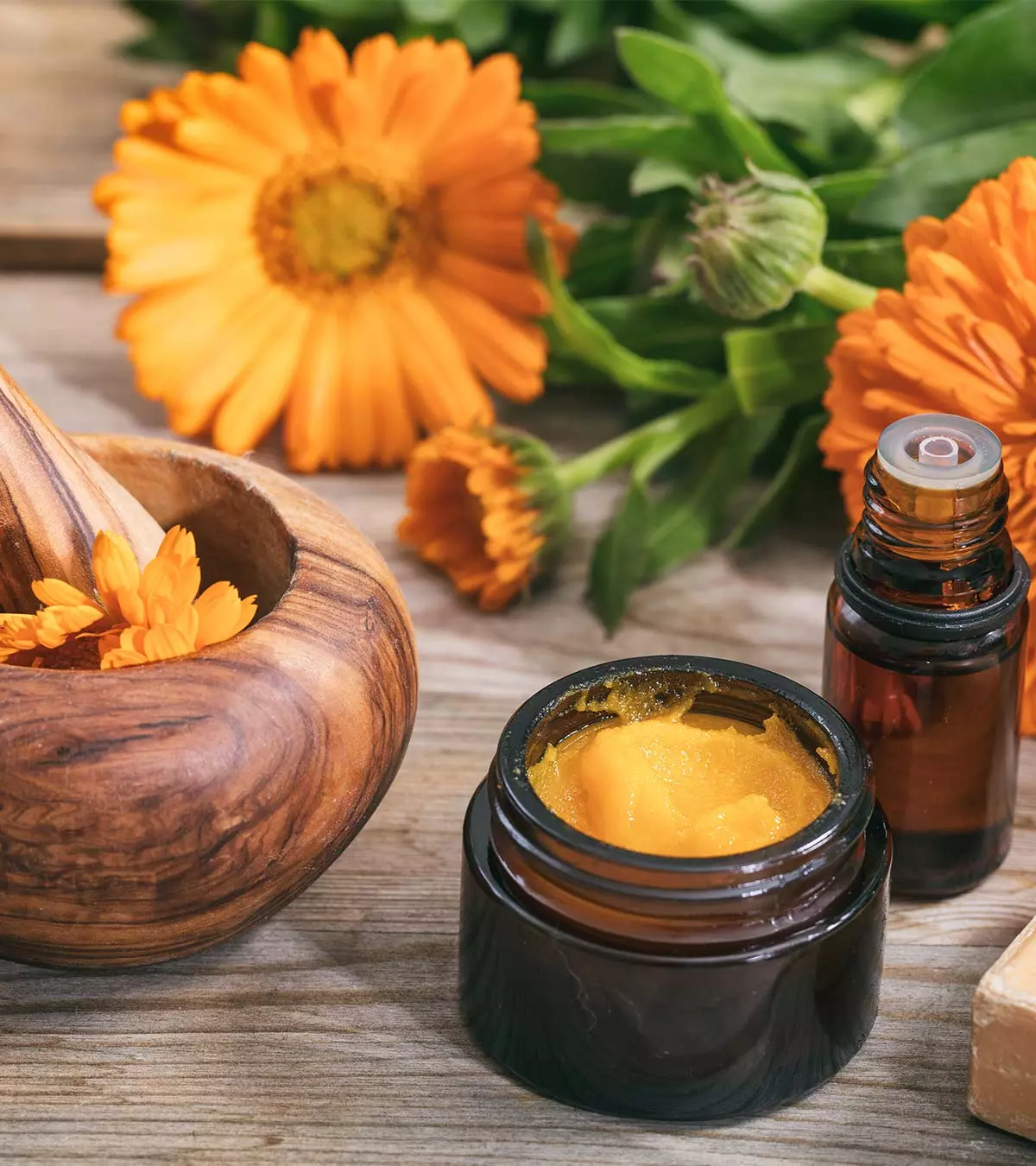
Image: Shutterstock
The flowers of the marigold or calendula have many therapeutic uses in alternative medicine. Its extract is used to treat several skin conditions. If you are being suggested to use this flower extract while carrying, here’s all you need to know about calendula during pregnancy. Calendula has many phytochemicalsiNaturally occurring compounds in plants that provide health benefits to humans with anti-spasmodic, antipyretic, antiseptic, antimicrobial, antifungal, anti-inflammatory, immunomodulatory, and stimulant properties It is also rich in carotenoidsiColored pigments found in plant-based foods that act as a precursor in the synthesis of vitamin A , carbohydrates, and phenolic compoundsiAntioxidant compounds naturally and widely found in foods derived from plants and animals , making it a common ingredient in many medicines (1). However, it may feel unsafe to use an unknown substance during pregnancy. Read on to learn more about calendula, its uses, and side effects.
Key Pointers
- Calendula has antipyretic, antispasmodic, stimulant, and antiseptic properties.
- Calendula can be beneficial in treating skin problems, eye diseases, ulcers, and wounds.
- The safety of consuming calendula tea during pregnancy is unknown, and it may interfere with conception and result in miscarriage.
- Calendula tea has the potential to induce labor and cause uterine contractions, making it unsafe during pregnancy.
- Topical use of calendula during pregnancy is not recommended, and consulting a doctor before using it is advised.
Are Marigolds The Same As Calendula?

No. Calendula is different from ornamental marigolds, which are commonly found in gardens (2) Calendula is typically found in Europe, Western Asia, and the US, and blooms from early spring until frost with orange-yellow flowers (3). It is used in traditional medicine and several home remedies treat, cure, or manage certain skin conditions. Its use is also prevalent for general skin care purposes.
 Did You Know?
Did You Know?General Medicinal Uses Of Calendula
Calendula is used as a natural remedy to treat wounds, ulcers, skin damage, frostbite, and eye diseases.
Complementary therapy uses it in suspension or tinctures used for topical application to treat acne, and inflammation, and soothe skin irritation, yeast infections, and varicose veins (4). Many women opt for homeopathic medicines during pregnancy as they are known to offer gentle relief for common discomforts. Calendula is an active ingredient in many homeopathic medicines that relieves nausea and vomiting.
Is Calendula Safe During Pregnancy?
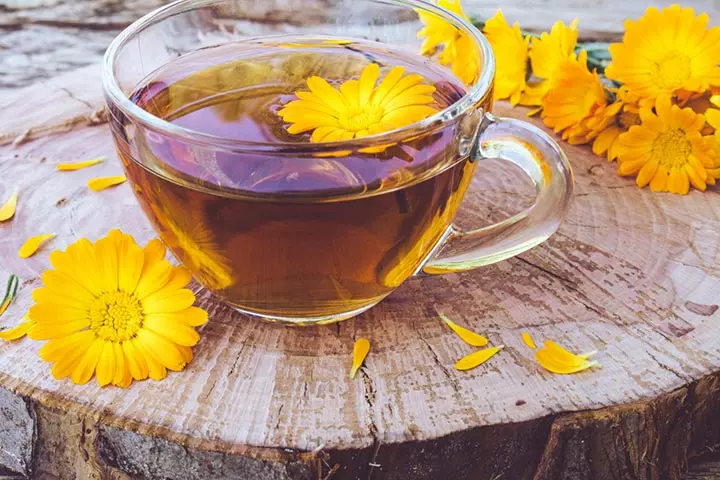
Some experts believe that consumption of calendula is not safe during pregnancy, as it can interfere with conception and increase the miscarriage risk (3).
A study on the effects of hydroalcohol extract from Calendula officinalis flowers on the reproductive function of female Wistar rats showed mixed results. The extract was non-toxic when administered during preimplantation and organogenic period (a stage when the embryo forms a few organs). However, it caused a decrease in maternal weight when given during the fetal period (when the embryo had turned into a fetus) (5). Despite the research on rats, there are no studies to determine its safety among pregnant women.
 Be watchful
Be watchfulIs It Safe To Use Calendula Topically During Pregnancy?
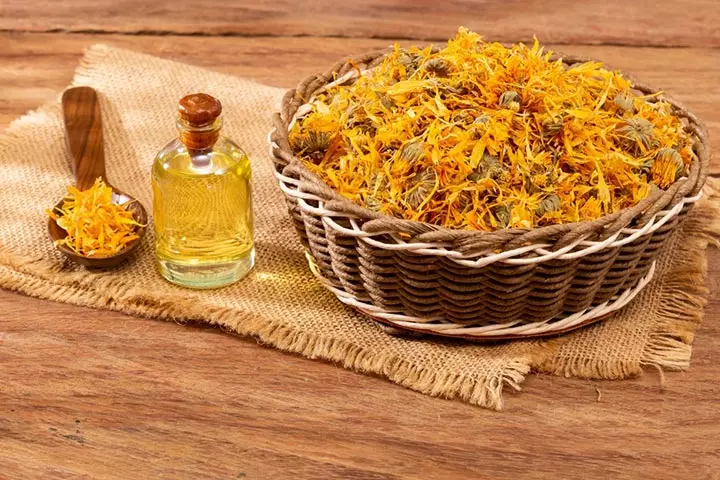
European Scientific Cooperative on Phytotherapy (ESCOP) does not recommend the topical use of calendula since there is no data to determine its safety during pregnancy (6).
Calendula is used as one of the ingredients in stretch marks removal oil, which is considered effective and does not show any adverse reactions (7). Also, many topical creams and skin care oils contain calendula among their ingredients. Always check the ingredients of a cream or oil and discuss its safety with your obstetrician before using it.
Is Calendula Tea Safe During Pregnancy?
Research suggests that water infusions of calendula flowers can cause contractions of the uterus and induce labor (6). Thus, it raises the risk of preterm labor if ingested
Side Effects Of Calendula

Apart from likely being unsafe during pregnancy, there are no specific side effects or complications associated with calendula. However, it may cause drowsiness when combined with some medications used during or after surgery (2). Some individuals may also experience allergic reactions, such as skin rashes (8).
Calendula may also interact with CNS depressants and cause breathing difficulties and excessive sleepiness. Animal studies also noted that higher doses of calendula consumption lowered blood pressure and blood sugar and also led to mild ocular irritation, hepatotoxicity, and renal overload. Since further studies testing for such side effects in humans are inconclusive, experts suggest avoiding calendula during pregnancy (13).
Furthermore, some individuals may also experience allergic reactions, such as skin rashes, if they have pre-existing allergies to ragweed, chrysanthemums, marigolds, daisies, and others in the Asteraceae/Compositae family (2) (8).
Frequently Asked Questions
1. Who should not use calendula?
Calendula should not be applied or consumed if you are allergic to plants in the aster or daisy family, such as chrysanthemums, marigolds, daisies, and ragweed (2) (8).
2. What is homeopathic calendula used for?
Nowadays, calendula is not ingested but topically applied. It is often used for burns, bruises, and cuts (8). It has an antiseptic effect on the burned area and hastens the wound healing process (9). The herbal form can be used as a tincture, ointment, or compress on boils and sores (10).
3. Does calendula raise blood pressure?
A study on animals shows that high doses of calendula lower blood pressure and cholesterol (11).
It is also helpful to learn about the herbs to avoid during pregnancy as they may pose risks to both the mother and the baby. Consult your doctor before using any ingredient whose safety is questionable during pregnancy. If some specific ingredients are not suitable for consumption, you should avoid them until after delivery. The same is with calendula during pregnancy. Although it can treat several skin conditions, experts suggest not using it topically or taking it orally in tea form during pregnancy. It is likely to cause uterine contractionsiPeriodic tightening of the uterus muscles during childbirth or menstruation and miscarriage. Therefore, avoiding it is a better idea.
This post is for informational purposes only and is not a replacement for a doctor’s consultation. Do not use any medication without talking to your doctor.
Infographic: Adverse Effects Of Calendula On Pregnant Women
Calendula is a flowering plant that resembles a marigold and is used in herbal treatments for stretch marks, wounds, and skin damage. However, you should exercise caution when using any herbal medications, including those containing calendula, while you are pregnant. Learn about some possible adverse effects it may have on expectant mothers through the infographic below. Illustration: Momjunction Design Team
Illustration: Calendula During Pregnancy: Uses Interactions And Side Effects

Image: Stable Diffusion/MomJunction Design Team
References
1. Nelofer Jan, Khurshid Iqbal Andrabi, and Riffat John; Calendula officinalis – An Important Medicinal Plant with Potential Biological Properties; Indian National Science Academy
2. Calendula; Medline Plus; US National Library of Medicine
3. Calendula; Milton S. Hershey Medical Center; PennState Hershey
4. Vrish Ashwlayan; Therapeutic Potential of Calendula officinalis; Research Gate
5. Silva EJ et al., Reproductive assessment of hydroalcohol extract of Calendula officinalis L. in Wistar rats; NCBI (2009)
6. Assessment report on Calendula officinalis; European Medicines Agency
7. Summers B, The effect of a topically-applied cosmetic oil formulation on striae distensae; African Journals Online
8. Calendula; Mount Sinai Health System
9. Burns (Homeopathy)– Health Information Library | PeaceHealth.
10. Boils (Homeopathy); Health Information Library; PeaceHealth.
11. Diptarka Ray et al.Amelioration of myocardial ischemic reperfusion injury with Calendula officinalis; NCBI (2010)
12. Calendula; Washington College
13. Stephanie J Troscinsk; Herbal Remedies for Athletes: A Handbook;
Community Experiences
Join the conversation and become a part of our nurturing community! Share your stories, experiences, and insights to connect with fellow parents.
Read full bio of Dr. Burcu Saygan Karamürsel
Read full bio of shreeja pillai
Read full bio of Swati Patwal
Read full bio of Lorraine Teron











